Though it wasn't the first game of its type, Command & Conquer became synonymous with real-time strategy gaming when the very first game in the series was released in 1995. Along with Blizzard's Warcraft II, Command & Conquer helped build the foundation for one of PC gaming's most beloved genres, defining many of the real-time strategy conventions that are used today. And though Command & Conquer has seen its highs and lows over the years, the series' quirky, politically incorrect, comic-book-like take on modern warfare has remained intact all throughout, and it is upheld in the latest entry in the series, Command & Conquer: Generals. More importantly, Generals is easily one of the best Command & Conquer games yet, with the impressive visuals and highly refined and accessible gameplay that have come to characterize the best entries in this genre. Die-hard fans of Command & Conquer may lament a few of the departures Generals makes from the series' roots, and the game does have a few rough edges, but Generals is still one of the best real-time strategy games around.
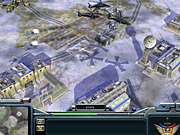
Generals' fictional premise puts the USA, China, and a terrorist group called the Global Liberation Army (GLA) at odds sometime in the near future. You can play as any one of these factions in its own brief single-player campaign, in skirmishes with computer opponents, or against other players over a LAN or using the game's online player-matching service. Those who played the previous two Command & Conquer RTS games, Red Alert 2 and its expansion pack, Yuri's Revenge, will note that Generals is highly reminiscent of those games, despite its much improved appearance and its seemingly more conventional array of infantry, tanks, and aircraft. Like in Red Alert 2, battles in Generals are often quick and decisive, largely due to the immense power of many of the game's units, the presence of devastating super weapons on each side, and the generally fast pace. Also, while each faction has a good variety of units at its disposal, you'll likely get the impression that the number of unit types per faction was limited so that each unit type could play an important role in most any fight--and also to leave room for an expansion pack. The lack of seafaring units in the game is a disappointing omission, given the importance of ships in most previous Command & Conquer games (not to mention in actual modern warfare), but the designers have still done an excellent job of imaginatively differentiating the game's three sides.
Despite the fact that the game's central conflict involves the USA and an obviously Middle Eastern terrorist group, the action in Generals is either over-the-top enough or abstract enough that, for better or worse, it shouldn't offend anyone's sensibilities. In fact, as if to drive home the sense that "Hey, it's just a game," there's really no story at all to Generals. The motivations of the respective factions aren't made clear, and their arsenals are far enough removed from reality that Generals seems much less inspired by current events and much more so by the current fascination with war in our popular culture. Movies like The Rock and Black Hawk Down certainly played a bigger part in inspiring the game's look and style than anything on the nightly news. It bears mentioning that almost all the mainstays of the Command & Conquer milieu can nevertheless be found in Generals--fans will be glad to see huge, double-barreled tanks, crack-shot commandos, nuclear missile silos, flamethrower tanks, and other such C&C mainstays back and looking better than ever. Many of the twists added to Red Alert 2 remain intact as well, such as the ability to garrison infantry in civilian buildings and the ability of units to gain experience levels by defeating foes.
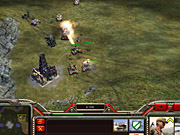
Other aspects of this new Command & Conquer are decidedly different. C&C fans may not notice right away, but Generals lacks a few of the series' signature elements. For instance, Command & Conquer games always did a nice job with their installation programs, many of which put you in the mood of the games even before you could begin playing. But Generals has a boring install program, just like every other game. Also, previous Command & Conquer games made prodigious use of full-motion video cutscenes to move their stories along. Featuring recognizable actors, hammy performances, and surprisingly good production values, the full-motion video sequences of Command & Conquer have always been a distinguishing feature of the series--but the FMV is out of the picture now, too. These complaints hardly bear mentioning, but considering Generals' heritage, they're not irrelevant.
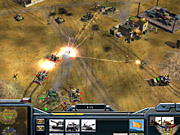
Not all the game's departures are cosmetic. Debates used to rage on the Internet as to whether Command & Conquer or Warcraft II had the better interface, and as if to settle the score once and for all, Generals retreats away from some of the C&C standards in favor of the Blizzard school of thought. The signature right-hand interface from previous C&C games is replaced by the signature Blizzard-style interface situated at the bottom of the screen. The signature C&C fog of war, which provides you with unlimited line of sight as soon as you explore the map, has been replaced by the signature Blizzard fog of war, which limits your ability to see enemy positions outside of your forces' field of view. The signature C&C base building, which allows you to erect new structures almost instantly but forces you to place them adjacent to your other structures, has been replaced by the signature Blizzard base building, which allows your worker unit to build new structures pretty much anywhere. These are all sensible decisions that make Command & Conquer: Generals more strategic and ultimately more entertaining, but it's still odd to see the series have a change of heart after all this time. One aspect of Command & Conquer's traditional control scheme that does remain intact is that mouse controls revolve entirely around the left mouse button, which is used both to select units and to issue attack orders. The right mouse button is only for de-selecting things, and those accustomed to recent games that use the right mouse button for move and attack orders may find that this scheme takes a bit of getting used to.
The gameplay itself is what you'd expect from a Command & Conquer game--it's fast, responsive, and filled with lots of great explosions. There's no dillydallying about, just a quick-and-dirty setup process where you slap down a few key structures and then move on to cranking out a good, mixed group of forces. Numerous, unique upgrades are also available to each faction, competing for your resources. Resource gathering, while slightly different for each faction, is fully automated like in Red Alert 2. The US helicopters, Chinese supply trucks, and GLA workers will all make a beeline for the closest batch of "supply," which is basically a big stockpile of valuables just sitting there and waiting to be collected. As in all Command & Conquer games, a viable strategy in Generals is to attack the enemy's all-important gatherers, though the buildings in the game can't withstand much damage, either. You can't build walls, base defenses are pretty flimsy, and a lot of the buildings are quite large and vulnerable--so the game definitely favors an aggressive style of play. Overly defensive play will merely land you front-row seats to the fiery destruction of your own base.
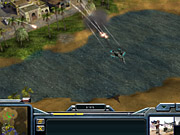
Regardless, a few interface issues may get in the way of your efforts. While you can manually set formations for your forces, unit formations aren't handled nearly as well here as in some other recent real-time strategy games, resulting in battles that are often very chaotic. Your forces may frequently drift away from each other, so you'll often have trouble focusing your fire on individual targets. The pathfinding for your units is generally good--they'll conveniently move out of each other's way, but sometimes you'll see a unit of yours sustaining damage without returning fire, or maneuvering weirdly around buildings or other obstacles. The game's menu screens look rushed when compared with the polished in-game graphics. None of these are major problems, but they're noticeable, and they might give you the sense that they could have been fixed with just a bit more time.
One of the game's new features is the "generals" ability system, which is basically an experience system that lets you unlock new units, technologies, and powers as you rack up kills. Much like the experience system used for heroes in Warcraft III, the experience element featured in Generals lets you spend points earned in successive victories on new abilities for your faction. It's a good system that adds to the number of viable strategic options in the game, letting you concentrate on some of your faction's key strengths or gain an ace up your sleeve in the form of an artillery attack or bombing run.
The three factions themselves are about as different as can be. The USA has the costliest but most technologically advanced units, plus the most diverse and powerful air force. China has strength in numbers, and the nation's relatively slow but powerful forces gain additional bonuses when attacking in hordes. The GLA has no air force at all, and its ramshackle units seem worse than those of the other two factions, but these units can upgrade themselves using the scrap left behind by their fallen foes, and the GLA's units are also the quickest and stealthiest of the three factions, able to swarm around the battlefield using tunnel networks. Each faction has some really interesting options. The USA's ground vehicles can build support drones for scouting or combat, and its rangers have flash-bang grenades that can devastate enemy troops. China's overlord tanks are so enormous that you can build defensive structures on their topsides, and its hackers can steal additional funds or dismantle enemy structures. The GLA's terrorists can capture civilian vehicles and use them to swiftly deliver deadly explosive charges, and their tanks can be outfitted with radioactive shells to better deal with enemy infantry. There are many more such examples for each side. You could easily make a case for any of the game's factions as the strongest, the coolest, or both.
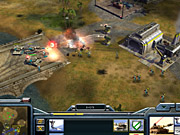
The three campaigns in Generals are short and disjointed, though the game's single-player missions are all quite good on their own terms. Rarely is the goal merely to wipe out the opposing forces, at least not without performing some other interesting tasks first. Most real-time strategy fans will find Generals to be a cakewalk at the default "normal" difficulty setting. The "hard" and "brutal" settings will provide more of a challenge, though even at these higher levels of difficulty, you may still find the computer mindlessly sending its forces into your kill zones. It should still make for a worthy opponent, however, due to its ability to quickly muster its forces and its tendency to occasionally surprise you. Of course, online play is really where the action is, and Generals lets you easily get into an online match and start racking up wins. A quick-play feature lets you jump into a match against similarly ranked opponents, though the game unfortunately forces you to play in 800x600 resolution to use this option. You can still set up or join a custom match, and the game includes a good number of maps for two to eight players that are suitable both for skirmish and multiplayer. Plus, there's a "world builder" utility available for making your own maps, though it's undocumented and allegedly still in beta.
Generals looks really, really good, though you'll need a system that meets or exceeds the game's recommended requirements to get it to run smoothly. White-hot pyrotechnics and outstanding particle effects make for what are probably the best explosions of any real-time strategy game to date, and you'll see no shortage of explosions during the typical Generals match. The other effects and animations are also great, such as when a pack of unlucky infantry is sent flying like so many rag dolls by a nearby blast. The game's terrain graphics are superb, and all in all, it's easy to forget that this is the first-ever fully 3D Command & Conquer RTS, since it looks so good. Those without recent systems will probably have to tone down the graphics options to keep the frame rate from chugging, but even so, they'll be treated to the best-looking C&C game yet.
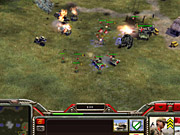
Meanwhile, the game's audio is a suitably remarkable counterpart to its graphics. In another departure for C&C, Generals is the first game in the series to feature musical themes exclusive to the playable factions. Previous C&C games have used a catchy techno score regardless of who was doing the fighting. In Generals, the USA's campaign is accompanied by a number of triumphant military marches, while China and the GLA have musical themes that establish their respective Eastern and Middle Eastern origins, yet also come off sounding grand and cinematic. Otherwise, you'll mostly just hear countless types of booming explosions while playing the game. The three factions' units all speak in English, though the Chinese and GLA units have stereotypical accents that fit well with the game's less-than-serious sensibility.
It may not take itself seriously, but Command & Conquer: Generals is still a very well-designed real-time strategy game, and it's unquestionably one of the strongest entries in the series yet. It's totally first-rate from a technical standpoint, and it's an all-around fun game to play on top of that, with excellent pacing, great explosions, clever strategic twists, a variety of units, and a fair amount of humor. It takes a few liberties with some of the franchise's conventions, but the core gameplay of Generals is still very much in the spirit of Command & Conquer, and that's truly the best thing about it.



